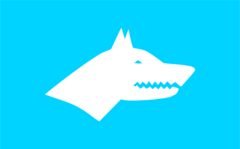Great Turan Society
Great Turan Society بۈيۈك تۇران جەمئىيىتى | |
|---|---|
 Flag Flown by the Great Turan Society | |
| Prymalian name | بۈيۈك تۇران جەمئىيىتى |
| Leader | Khadagan Daldurkhan |
| Founder | Khadagan Daldurkhan |
| Founded | 2002, February 4 |
| Newspaper | Shielders of Freedom |
| Paramilitary Wing | Iron Wolves |
| Paramilitary Size | 23,639 |
| Party Size | 72,936 |
| Ideology | Turanism Prymalian Supremacy Arabophobia Slavophobia Thrismariscepticism Factions Thrismari-Thuadia Unionism Monarchism |
| Political position | Far-Right |
| Religion | Tengrism |
| Colors | Light Blue, White |
| Slogan | "Turanian Peoples, Unite!" |
| Anthem | مەڭگۈ تۇران ، ئۆلۈم ئۇنىڭ دۈشمىنىگە بولسۇن! (Forever Turan, Death be Upon her enemies!) |
The Great Turan Society is a far-right paramilitary organization. It also doubles as a political party, which has 4 seats in parliament. Despite this weak authority in politics, it has quite a bit of influence mainly in the sparsely populated countryside. It is sometimes seen terrorizing the minority areas of Prymalia, though few casualties have actually been reported. Several politicians have expressed concern over this movement, mainly its paramilitary movement.
Founding
It was founded in 2002 by Khadagan Daldurkhan, who still leads the party to this day. He founded it as a response to Prymalia joining the Thrismari Union in 2001, a move he greatly disapproved of, and mixed in his turanist and ultranationalist beliefs to make the party. It expressed many radical and xenophobic ideas as well, having a distaste to Arabs and Slavs specifically. It initially was a small force, with it mostly having been made up of friends who shared the same political beliefs. It slowly gained traction across the country as time went on, especially in the south.
Expansion
As its support base grew, so did its newly founded paramilitary, the Iron Wolves. The south was supportive as it had been mostly neglected by the northern government, seeing the society as an alternative that would bring about prosperity to the entire nation, the south included. It also became popular with ethnic Prymalians in Arabistan and Ruthynia, who felt underrepresented in these areas and resented the autonomous governments there. But as it grew, opposition to it became larger as well. Leftist parties were the largest groups in opposition to the organization, as it went directly against their federalist ideals.